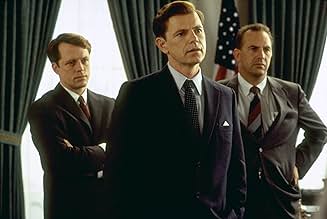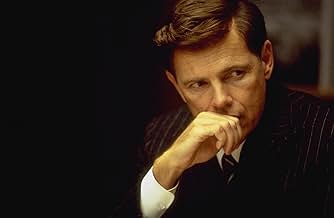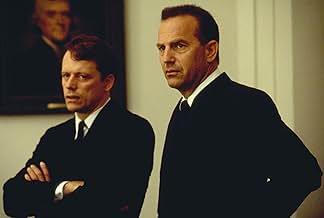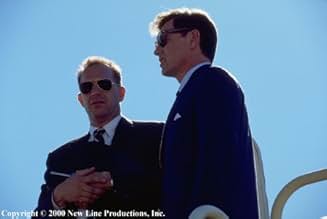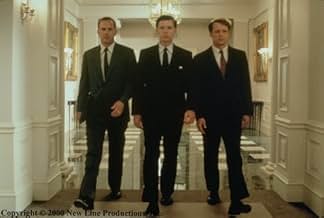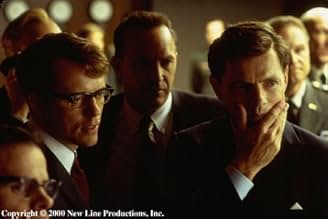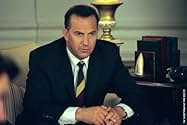अक्टूबर 1962 में, कैनेडी प्रशासन क्यूबा मिसाइल संकट को रोकने के लिए संघर्ष कर रहा है.अक्टूबर 1962 में, कैनेडी प्रशासन क्यूबा मिसाइल संकट को रोकने के लिए संघर्ष कर रहा है.अक्टूबर 1962 में, कैनेडी प्रशासन क्यूबा मिसाइल संकट को रोकने के लिए संघर्ष कर रहा है.
- निर्देशक
- लेखक
- स्टार
- पुरस्कार
- 3 जीत और कुल 8 नामांकन
फ़ीचर्ड समीक्षाएं
The 1962 Cuban Missile Crisis seen through the eyes of President assistant Kenny O'Donnell (Kevin Costner who hands perfectly the role )as trusted confidante and with significance importance of Robert Kennedy ( Steven Culp who bears remarkable resemblance )and of course President John F . Kennedy ( a solid Bruce Greenwood ) . This interesting film widely develops the Cuban Missile Crisis that was a confrontation between the Soviet Union, Cuba and the United States in October 1962, during the Cold War. The picture is packed with suspense , drama , historical deeds and is quite entertaining . It's correctly based on facts and the few sacrifices of accuracy are realized in the sense of of dramatic license . The motion picture is very well directed by Roger Donaldson who formerly worked with Costner in another suspenseful movie and also plenty of political intrigue titled ¨No way out (87) ¨ .
Adding more details over the widely depicted on the movie the events happened of the following manner : In September 1962, the Cuban and Soviet governments began to surreptitiously build bases in Cuba for a number of medium- and intermediate-range ballistic nuclear missiles (MRBMs and IRBMs) with the ability to strike most of the continental United States. This action was subsequent to the 1958 deployment of Thor IRBMs in the UK and Jupiter IRBMs to Italy and Turkey in 1961; more than 100 U.S.-built missiles having the capability to strike Moscow with nuclear warheads. On October 14, 1962, a United States U-2 photo-reconnaissance plane captured photographic proof of Soviet missile bases under construction in Cuba.The ensuing crisis ranks with the Berlin Blockade as one of the major confrontations of the Cold War and is generally regarded as the moment in which the Cold War came closest to turning into a nuclear conflict .The US President ( Bruce Greenwood) , Attorney General Robert Kennedy (Steven Culp ),State Secretary Robert McNamara ( Dylan Baker ) and his military staff ( Bill Smitrovich , Ed Lauter , James Karen , Len Cariou) and general Curtis LeMay (Kevin Conway ) considered attacking Cuba via air and sea and settled on a "quarantine" of Cuba. The U.S. announced that it would not permit offensive weapons to be delivered to Cuba and demanded that the Soviets dismantle the missile bases already under construction or completed in Cuba and remove all offensive weapons. The Kennedy administration held a slim hope that the Kremlin would agree to their demands, and expected a military confrontation. On the Soviet end, Nikita Khrushchev wrote Kennedy that his quarantine of "navigation in international waters and air space to constitute an act of aggression propelling humankind into the abyss of a world nuclear-missile war." Fidel Castro encouraged Khrushchev to launch a preemptive first-strike nuclear attack on the U.S. The Soviets publicly balked at the U.S. demands, but in secret back-channel communications initiated a proposal to resolve the crisis. The confrontation ended on October 28, 1962 when President John F. Kennedy and United Nations Secretary-General U Thant reached an agreement with Soviet Premier Nikita Khrushchev to dismantle the offensive weapons and return them to the Soviet Union, subject to United Nations verification, in exchange for an agreement by the United States to never invade Cuba. The Soviets removed the missile systems and their support equipment, loading them onto eight Soviet ships from November 5–9. A month later, on December 5 and 6, the Soviet IL-28 bombers were loaded onto three Soviet ships and shipped back to Russia. The quarantine was formally ended previously on November 20, 1962. As a secret part of the agreement, all US-built Thor and Jupiter IRBMs deployed in Europe were deactivated by September 1963.The Cuban Missile Crisis spurred the creation of the Hotline Agreement and the Moscow-Washington hot line, a direct communications link between Moscow and Washington .
Adding more details over the widely depicted on the movie the events happened of the following manner : In September 1962, the Cuban and Soviet governments began to surreptitiously build bases in Cuba for a number of medium- and intermediate-range ballistic nuclear missiles (MRBMs and IRBMs) with the ability to strike most of the continental United States. This action was subsequent to the 1958 deployment of Thor IRBMs in the UK and Jupiter IRBMs to Italy and Turkey in 1961; more than 100 U.S.-built missiles having the capability to strike Moscow with nuclear warheads. On October 14, 1962, a United States U-2 photo-reconnaissance plane captured photographic proof of Soviet missile bases under construction in Cuba.The ensuing crisis ranks with the Berlin Blockade as one of the major confrontations of the Cold War and is generally regarded as the moment in which the Cold War came closest to turning into a nuclear conflict .The US President ( Bruce Greenwood) , Attorney General Robert Kennedy (Steven Culp ),State Secretary Robert McNamara ( Dylan Baker ) and his military staff ( Bill Smitrovich , Ed Lauter , James Karen , Len Cariou) and general Curtis LeMay (Kevin Conway ) considered attacking Cuba via air and sea and settled on a "quarantine" of Cuba. The U.S. announced that it would not permit offensive weapons to be delivered to Cuba and demanded that the Soviets dismantle the missile bases already under construction or completed in Cuba and remove all offensive weapons. The Kennedy administration held a slim hope that the Kremlin would agree to their demands, and expected a military confrontation. On the Soviet end, Nikita Khrushchev wrote Kennedy that his quarantine of "navigation in international waters and air space to constitute an act of aggression propelling humankind into the abyss of a world nuclear-missile war." Fidel Castro encouraged Khrushchev to launch a preemptive first-strike nuclear attack on the U.S. The Soviets publicly balked at the U.S. demands, but in secret back-channel communications initiated a proposal to resolve the crisis. The confrontation ended on October 28, 1962 when President John F. Kennedy and United Nations Secretary-General U Thant reached an agreement with Soviet Premier Nikita Khrushchev to dismantle the offensive weapons and return them to the Soviet Union, subject to United Nations verification, in exchange for an agreement by the United States to never invade Cuba. The Soviets removed the missile systems and their support equipment, loading them onto eight Soviet ships from November 5–9. A month later, on December 5 and 6, the Soviet IL-28 bombers were loaded onto three Soviet ships and shipped back to Russia. The quarantine was formally ended previously on November 20, 1962. As a secret part of the agreement, all US-built Thor and Jupiter IRBMs deployed in Europe were deactivated by September 1963.The Cuban Missile Crisis spurred the creation of the Hotline Agreement and the Moscow-Washington hot line, a direct communications link between Moscow and Washington .
Basically this movie is a great history lesson. If you want to know more about the cold war and the Cuba missile crisis in particular this is a perfect medium for you to start with. The movie is quite detailed and accurate even though of course some moments and characters have been 'over-dramatized' for the good of the movie and its flow and emotions.
Even though you already know from start till finish how this movie is going to end, it still is a tense movie to watch. The story is build up well and makes the movie really interesting and compelling to follow. It perfectly captures the tension of the whole crisis and really makes you realize how close the world actually came to a WW III. It makes us aware of the fact that those 13 days in history should always be remembered and used as a lesson for the entire world now and forever. It's too bad that the movie becomes a bit too moralistic at times, especially toward the ending.
Bruce Greenwood doesn't really look like JFK but he's a good actor, so he becomes believable enough in his role trough his acting skills. Steven Culp really does look like Robert Kennedy and on top of that he also is a great actor. I wasn't always happy with Kevin Costner performance but overall he did an acceptable job. There are some weaker moments which involves his character but I more blame those moments to the at times too moralistic written script.
A bit of a disappointing aspect of the whole movie is its style. Roger Donaldson at times tries to be over-artistic and mixes the movie with black & white and color images. Perhaps he tried to copy Oliver Stone's style? Who knows. The cinematography was also disappointingly standard but thankfully the good editing saved this a little. Also the musical score by Trevor Jones is surprisingly solid.
Overall it's a very good political movie that has some great tense and important moments in it and also works great as a history lesson.
8/10
http://bobafett1138.blogspot.com/
Even though you already know from start till finish how this movie is going to end, it still is a tense movie to watch. The story is build up well and makes the movie really interesting and compelling to follow. It perfectly captures the tension of the whole crisis and really makes you realize how close the world actually came to a WW III. It makes us aware of the fact that those 13 days in history should always be remembered and used as a lesson for the entire world now and forever. It's too bad that the movie becomes a bit too moralistic at times, especially toward the ending.
Bruce Greenwood doesn't really look like JFK but he's a good actor, so he becomes believable enough in his role trough his acting skills. Steven Culp really does look like Robert Kennedy and on top of that he also is a great actor. I wasn't always happy with Kevin Costner performance but overall he did an acceptable job. There are some weaker moments which involves his character but I more blame those moments to the at times too moralistic written script.
A bit of a disappointing aspect of the whole movie is its style. Roger Donaldson at times tries to be over-artistic and mixes the movie with black & white and color images. Perhaps he tried to copy Oliver Stone's style? Who knows. The cinematography was also disappointingly standard but thankfully the good editing saved this a little. Also the musical score by Trevor Jones is surprisingly solid.
Overall it's a very good political movie that has some great tense and important moments in it and also works great as a history lesson.
8/10
http://bobafett1138.blogspot.com/
I served aboard the USS Joseph P. Kennedy which was depicted in the film. The Kennedy was the ship that boarded the Marcula in the waters off the Bahamas. The Kennedy, now part of Battleship cove in Fall River, Ma., actually played herself in the film. The actual boarding was not as quite dramatic as depicted in the movie.
The boarding party for instance did not wear dress white uniforms and the Marcula was more of a "rust bucket" than depicted in the movie. Although the 5 inch guns were aimed at the vessel, I don't recall a shot being fired.
As far as the movie is concerned I though it gave a rather accurate accounting of the circumstances that surrounded this time in history with a few embellishment's that are purely thrown in as theatrical license.
The boarding party for instance did not wear dress white uniforms and the Marcula was more of a "rust bucket" than depicted in the movie. Although the 5 inch guns were aimed at the vessel, I don't recall a shot being fired.
As far as the movie is concerned I though it gave a rather accurate accounting of the circumstances that surrounded this time in history with a few embellishment's that are purely thrown in as theatrical license.
The fact of JFK's assassination, and especially the highly mysterious circumstances surrounding it, has resulted in a very distinct historical niche being carved around him. However, the majority of written examinations have concerned his assassination. The man's presidency, short though it was, was fraught with fascinating events and, both in literature and in film, they remain frustratingly under-examined. Which is why "Thirteen Days" is such a treat.
What the film essentially does is offer us a clearly partly-fictionalised but fairly true to the events account of the thirteen days of the Cuban Missile Crisis in 1962. It's a fascinating close-up on a fascinating man, who might have been a truly great president if he had gotten a proper chance. Of course, the filmic portrayal of JFK may be just a tad overly sympathetic, and the treatment of the military a tad overly harsh, and the importance of Kenny O'Donnell, played by Kevin Costner, is probably exaggerated, but these are minor quibbles. What this film really does is show us just how complicated and multi-faceted was the problem of Russian nuclear missiles being installed in Cuba. Not only did the president have to face the dim and distant threat of a faceless Russian bureaucracy, he had to deal with the multiple and conflicting options constantly being advanced to him, the dangers posed by certain special interests in military and intelligence and the popular opinion of the American people. The repercussions of any number of different courses of action were almost unthinkable. Tilting the hand seemingly in the American favour in one place, say in Cuba, would destabilise another danger zone, such as Berlin. Despite the fact that we all know how the events played out in the end, it can't be denied that this film keeps adding to the tension constantly, occasionally letting off a little and then piling on a whole lot more. It's a wonderful portrayal.
At its core, however, the film is an intelligent study of the ultimately paralysing effects of power, and the stark horror of mutual destruction as made possible by the harnessing of atomic power. The discovery of nuclear fission reactions has forever changed the face of warfare, because there now exists an ultimate solution so terrible it is almost beyond contemplation. In the comparatively safer times in which we now live, it is easy to forget how possible, perhaps even likely, the threat of nuclear war. America was then, and remains now, the most powerful nation on the planet, and yet a single wrong move could have ended all that, and at the cost of millions of innocent lives. Bearing the weight of decisions which could cost so much must have been a horrible burden to Kennedy, and, if nothing else, we should thank our lucky stars that he didn't buckle under the multifarious pressures placed on him. This film is a tribute to reason over hotheadedness, and peace over war. We should not forget the lessons that time has to impart, and if this represents a way to remember, then everyone ought to watch it.
What the film essentially does is offer us a clearly partly-fictionalised but fairly true to the events account of the thirteen days of the Cuban Missile Crisis in 1962. It's a fascinating close-up on a fascinating man, who might have been a truly great president if he had gotten a proper chance. Of course, the filmic portrayal of JFK may be just a tad overly sympathetic, and the treatment of the military a tad overly harsh, and the importance of Kenny O'Donnell, played by Kevin Costner, is probably exaggerated, but these are minor quibbles. What this film really does is show us just how complicated and multi-faceted was the problem of Russian nuclear missiles being installed in Cuba. Not only did the president have to face the dim and distant threat of a faceless Russian bureaucracy, he had to deal with the multiple and conflicting options constantly being advanced to him, the dangers posed by certain special interests in military and intelligence and the popular opinion of the American people. The repercussions of any number of different courses of action were almost unthinkable. Tilting the hand seemingly in the American favour in one place, say in Cuba, would destabilise another danger zone, such as Berlin. Despite the fact that we all know how the events played out in the end, it can't be denied that this film keeps adding to the tension constantly, occasionally letting off a little and then piling on a whole lot more. It's a wonderful portrayal.
At its core, however, the film is an intelligent study of the ultimately paralysing effects of power, and the stark horror of mutual destruction as made possible by the harnessing of atomic power. The discovery of nuclear fission reactions has forever changed the face of warfare, because there now exists an ultimate solution so terrible it is almost beyond contemplation. In the comparatively safer times in which we now live, it is easy to forget how possible, perhaps even likely, the threat of nuclear war. America was then, and remains now, the most powerful nation on the planet, and yet a single wrong move could have ended all that, and at the cost of millions of innocent lives. Bearing the weight of decisions which could cost so much must have been a horrible burden to Kennedy, and, if nothing else, we should thank our lucky stars that he didn't buckle under the multifarious pressures placed on him. This film is a tribute to reason over hotheadedness, and peace over war. We should not forget the lessons that time has to impart, and if this represents a way to remember, then everyone ought to watch it.
I watched this movie today with a number of students from my International Politics class, and from the standpoint of a politics professor, this film was absolutely extraordinary. This is a movie about the development of foreign policy in a crisis; it spells out with brilliant detail the decision-making process of JFK's inner circle, the tension between the Executive Office of the President and the Departments of State and Defense, and the attempts by the Military Industrial Complex (namely the Joint Chiefs) to undermine the diplomatic approaches favored by the president. It highlights the conflict between military standard operating procedures ("rules of engagement") and the better judgment/common sense of right-thinking human beings. It hints at conspiracies to (later) depose and otherwise get rid of both Kennedy and Khruschev from within for what turned out to be a very unpopular resolution with the hardliners on both sides. I especially like that the movie acknowledged the humanity of the individual decision-makers without getting too Capra-esquire or preachy.
I can see why this film hasn't been a great commercial success. It is not your standard big studio fare. It's quite cerebral, and although it has some exciting pre-conflict scenes, it's not a "war film". (It reminds me a bit of "Three Kings" in that regard- both films were, in my opinion, mis-marketed. They both seemed to target the younger male action crowd, when both movies are really made for a more intellectual audience.) I liked how the Soviets were not cartoonishly vilified, as is common in a lot of Cold War era films. They were shown to be somewhat calculating and strategic, but not irrational or more importantly, inhuman. In fact, one of the most fascinating parts of the film is the revelation that both sides lack information as to the other side's true intentions. It was this uncertainty that back in October 1962, could have led to the end of civilization as we know it.
The acting was solid (Steven Culp was very, very good as Robert Kennedy- so good, in fact, that I'm afraid he'll have a hard time getting cast in the future. There was audible gasp in the audience when he came on the screen and WAS Bobby). Coaster's accent was actually annoying (as an earlier reviewer noted), but it's forgivable in light of the moving, somewhat understated performance he turns in. It is the directing that takes the cake, however. From the moment the chain of events was set in motion, the tension does NOT let up. It actually feels like you are back in 1962 living through the events of those two weeks- honestly, there was nary a moment to relax until the resolution was wrought. I recommend this film especially strongly to high school and college age students who are too young to have any Cold War memory, as well as to those who lived through the era and may have forgotten what it felt like to come this close.
I can see why this film hasn't been a great commercial success. It is not your standard big studio fare. It's quite cerebral, and although it has some exciting pre-conflict scenes, it's not a "war film". (It reminds me a bit of "Three Kings" in that regard- both films were, in my opinion, mis-marketed. They both seemed to target the younger male action crowd, when both movies are really made for a more intellectual audience.) I liked how the Soviets were not cartoonishly vilified, as is common in a lot of Cold War era films. They were shown to be somewhat calculating and strategic, but not irrational or more importantly, inhuman. In fact, one of the most fascinating parts of the film is the revelation that both sides lack information as to the other side's true intentions. It was this uncertainty that back in October 1962, could have led to the end of civilization as we know it.
The acting was solid (Steven Culp was very, very good as Robert Kennedy- so good, in fact, that I'm afraid he'll have a hard time getting cast in the future. There was audible gasp in the audience when he came on the screen and WAS Bobby). Coaster's accent was actually annoying (as an earlier reviewer noted), but it's forgivable in light of the moving, somewhat understated performance he turns in. It is the directing that takes the cake, however. From the moment the chain of events was set in motion, the tension does NOT let up. It actually feels like you are back in 1962 living through the events of those two weeks- honestly, there was nary a moment to relax until the resolution was wrought. I recommend this film especially strongly to high school and college age students who are too young to have any Cold War memory, as well as to those who lived through the era and may have forgotten what it felt like to come this close.
क्या आपको पता है
- ट्रिवियाPresident John F. Kennedy very frequently set up recording machines during meetings at the White House. Much of the dialogue from the movie is taken directly from Kennedy's tapes.
- गूफ़President Kennedy wanted an eyewitness account so badly that Commander Ecker was ordered to the Pentagon to brief the Joint Chiefs of Staff immediately after landing his RF-8A Crusader, sweaty flight suit and all. This is often thought to be a glaring error in the movie, but his attire is absolutely accurate. Cdr. Ecker was not even allowed to exit his Crusader when he landed at NAS Cecil Field, Jacksonville FL. His film canisters were unloaded from his aircraft, he was refueled and sent immediately to Washington D.C., landing at Andrews AFB and whisked by limousine directly to the Pentagon where he met with the Joint Chiefs of Staff, apologizing right away for appearing at the briefing in his sweat-soaked flight suit. Cdr. Ecker, parched from the Cuba overflight and then the flight north to Washington, asked in a hoarse voice for a drink of water when he arrived. He refuses it in the movie.
- भाव
Kenny O'Donnell: If the sun comes up tomorrow, it is only because of men of good will. And that's - that's all there is between us and the devil.
- कनेक्शनEdited from Trinity and Beyond: The Atomic Bomb Movie (1995)
टॉप पसंद
रेटिंग देने के लिए साइन-इन करें और वैयक्तिकृत सुझावों के लिए वॉचलिस्ट करें
विवरण
- रिलीज़ की तारीख़
- कंट्री ऑफ़ ओरिजिन
- भाषाएं
- इस रूप में भी जाना जाता है
- Trece días
- फ़िल्माने की जगहें
- उत्पादन कंपनियां
- IMDbPro पर और कंपनी क्रेडिट देखें
बॉक्स ऑफ़िस
- बजट
- $8,00,00,000(अनुमानित)
- US और कनाडा में सकल
- $3,45,92,089
- US और कनाडा में पहले सप्ताह में कुल कमाई
- $46,668
- 25 दिस॰ 2000
- दुनिया भर में सकल
- $6,65,79,890
- चलने की अवधि2 घंटे 25 मिनट
- रंग
- ध्वनि मिश्रण
- पक्ष अनुपात
- 1.85 : 1
इस पेज में योगदान दें
किसी बदलाव का सुझाव दें या अनुपलब्ध कॉन्टेंट जोड़ें








